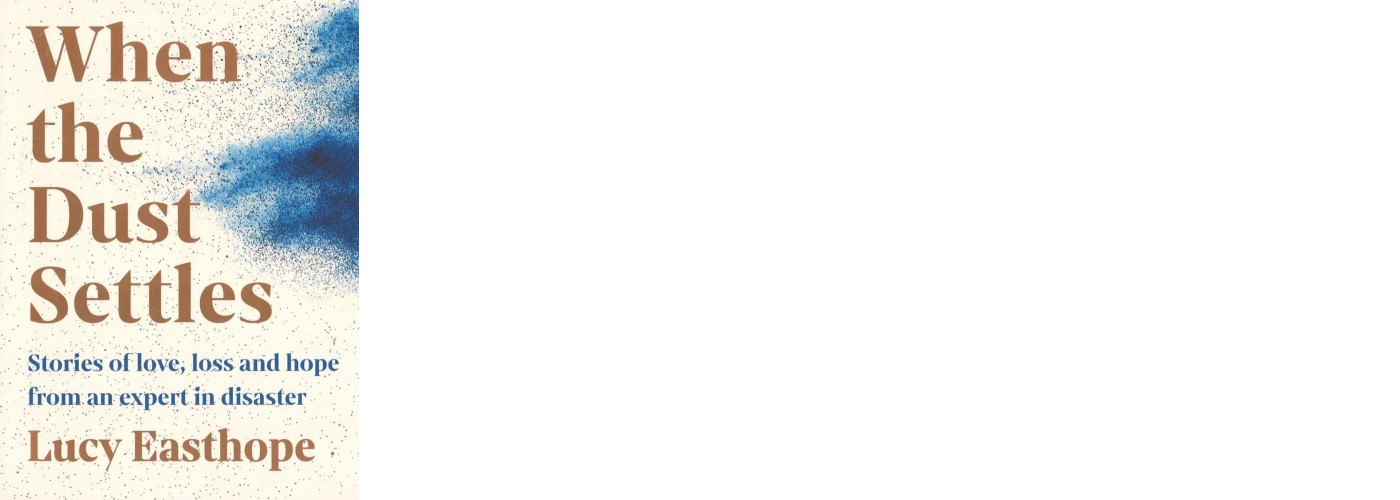Book review: When the Dust Settles by Lucy Easthope
Easthope’s memoir of her experiences as a disaster manager is ‘gripping and filled with compassion’

A free daily email with the biggest news stories of the day – and the best features from TheWeek.com
You are now subscribed
Your newsletter sign-up was successful
“Lucy Easthope doesn’t look like your average superhero,” said Laura Hackett in The Sunday Times. “She describes herself as short, round, arthritic and clumsy.” And yet, like a superhero, she turns up whenever calamity strikes, and endeavours to make things better. For more than two decades, Easthope has been a disaster manager – a job that requires her to coordinate recovery efforts in the wake of major catastrophes. Her tasks in such situations range from identifying bodies and recovering victims’ personal belongings to “relocating people who have lost their homes to floods, and planning ahead for possible future disasters”. And she has been involved in the aftermath of some of the worst disasters of recent times – the 2004 Boxing Day tsunami, the Fukushima nuclear disaster of 2011, the Grenfell Tower fire of 2017. When the Dust Settles, her memoir of these experiences, is a “gripping account, filled with compassion”.
Easthope, who grew up in Liverpool, says it was witnessing the impact of the Hillsborough disaster of 1989 that set her on her career path, said Jasper Rees in The Daily Telegraph. She studied for a master’s in disaster management, and was then hired by a company called Kenyon International Emergency Services, where she was tasked with preparing a mortuary for British service personnel killed in Iraq. At the core of her job is a “process known as Disaster Victim Identification, which involves painstaking analysis by pathologists, anthropologists and odontologists to append a name to flesh, bone and teeth”. Inevitably, there are sections that are gruesome to read, but her account is never less than “riveting”. This is a book that will do for disaster management “what Rachel Clarke’s Dear Life has done for palliative medicine and Adam Kay’s This Is Going to Hurt for obstetrics”.
As well as being grimly fascinating to read about, Easthope’s job is of crucial importance, said Matthew Reisz in The Observer. As she points out, if disasters are handled insensitively, it can greatly “amplify the suffering of families”. Get things right, on the other hand, and an important step will have been taken towards helping people and communities recover. So it is “somewhat dispiriting” to learn that she thinks “a slow rot” has set in in British disaster planning, with the focus shifting lately from doing what is best for the victims to prioritising the “optics” of a catastrophe. By drawing back the curtain on her “largely hidden” profession, Easthope’s “enthralling” book points the way towards a more humane approach.
The Week
Escape your echo chamber. Get the facts behind the news, plus analysis from multiple perspectives.

Sign up for The Week's Free Newsletters
From our morning news briefing to a weekly Good News Newsletter, get the best of The Week delivered directly to your inbox.
From our morning news briefing to a weekly Good News Newsletter, get the best of The Week delivered directly to your inbox.
Hodder & Stoughton 304pp £20; The Week Bookshop £15.99

The Week Bookshop
To order this title or any other book in print, visit theweekbookshop.co.uk, or speak to a bookseller on 020-3176 3835. Opening times: Monday to Saturday 9am-5.30pm and Sunday 10am-4pm.
A free daily email with the biggest news stories of the day – and the best features from TheWeek.com
-
 Film reviews: ‘Wuthering Heights,’ ‘Good Luck, Have Fun, Don’t Die,’ and ‘Sirat’
Film reviews: ‘Wuthering Heights,’ ‘Good Luck, Have Fun, Don’t Die,’ and ‘Sirat’Feature An inconvenient love torments a would-be couple, a gonzo time traveler seeks to save humanity from AI, and a father’s desperate search goes deeply sideways
-
 Political cartoons for February 16
Political cartoons for February 16Cartoons Monday’s political cartoons include President's Day, a valentine from the Epstein files, and more
-
 Regent Hong Kong: a tranquil haven with a prime waterfront spot
Regent Hong Kong: a tranquil haven with a prime waterfront spotThe Week Recommends The trendy hotel recently underwent an extensive two-year revamp
-
 Film reviews: ‘Wuthering Heights,’ ‘Good Luck, Have Fun, Don’t Die,’ and ‘Sirat’
Film reviews: ‘Wuthering Heights,’ ‘Good Luck, Have Fun, Don’t Die,’ and ‘Sirat’Feature An inconvenient love torments a would-be couple, a gonzo time traveler seeks to save humanity from AI, and a father’s desperate search goes deeply sideways
-
 A thrilling foodie city in northern Japan
A thrilling foodie city in northern JapanThe Week Recommends The food scene here is ‘unspoilt’ and ‘fun’
-
 Tourangelle-style pork with prunes recipe
Tourangelle-style pork with prunes recipeThe Week Recommends This traditional, rustic dish is a French classic
-
 Samurai: a ‘blockbuster’ display of Japan’s legendary warriors
Samurai: a ‘blockbuster’ display of Japan’s legendary warriorsThe Week Recommends British Museum show offers a ‘scintillating journey’ through ‘a world of gore, power and artistic beauty’
-
 BMW iX3: a ‘revolution’ for the German car brand
BMW iX3: a ‘revolution’ for the German car brandThe Week Recommends The electric SUV promises a ‘great balance between ride comfort and driving fun’
-
 Arcadia: Tom Stoppard’s ‘masterpiece’ makes a ‘triumphant’ return
Arcadia: Tom Stoppard’s ‘masterpiece’ makes a ‘triumphant’ returnThe Week Recommends Carrie Cracknell’s revival at the Old Vic ‘grips like a thriller’
-
 My Father’s Shadow: a ‘magically nimble’ love letter to Lagos
My Father’s Shadow: a ‘magically nimble’ love letter to LagosThe Week Recommends Akinola Davies Jr’s touching and ‘tender’ tale of two brothers in 1990s Nigeria
-
 Send Help: Sam Raimi’s ‘compelling’ plane-crash survival thriller
Send Help: Sam Raimi’s ‘compelling’ plane-crash survival thrillerThe Week Recommends Rachel McAdams stars as an office worker who gets stranded on a desert island with her boss